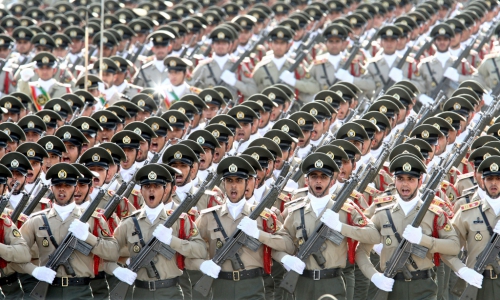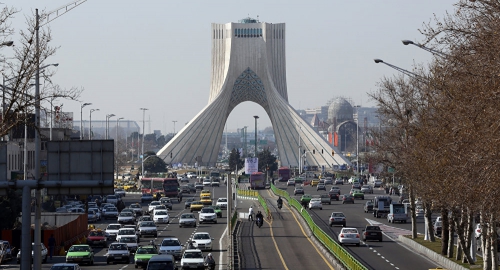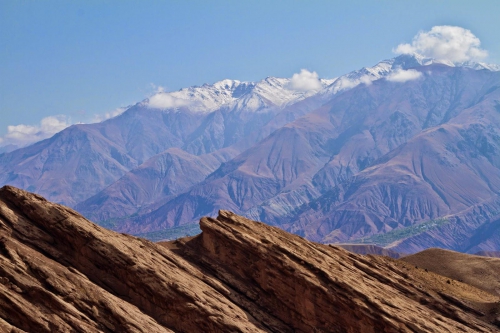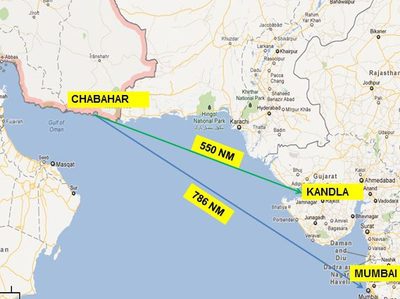« Interview: A history of russophobia – as seen by Hannes Hofbauer | Page d'accueil | Dominique Venner : il breviario dei ribelli »
samedi, 11 juin 2016
Iran as a Multipolar anchor

Iran as a Multipolar anchor
Iran has proven to be one of the staunchest anti-US hegemony states in the world. Since the 1979 revolution Tehran has fought bitter US/Isreali-induced wars in Iraq, the Persian Gulf, Syria, Lebanon and occupied Palestine, either directly or indirectly, while also facing harsh economic sanctions from the West. The Islamic Republic of Iran is a capable and shrewd regional power that will always affect the fate of the Middle east as history has shown for centuries past. The country occupies a geostrategic position that straddles the Middle east, the Persian Gulf region/Arabian sea, Central Asia, South Asia and the Caucus/Caspian region. Those key regions will be a crucial ''pivot'' for the 21st century great power geopolitical competition.
The Unipolar US will try to isolate the Eurasian great powers, Russia and China, by controlling "the rimlands'' of Eurasia and by destabilizing the above mentioned regions with its preferred hybrid wars. Iran will be a key node that the US will need to connect its NATO/Turkey military bases with its Iraq/GCC/Afghanistan/Pakistan military presence through potential actual military presence in India, and all the way to Mynamar and into its Asia Pacific military hubs. If Washington gets its way in having military presence in Iran and as it seems in India, then "the Great Geopolitical Wall" against Eurasian great powers will be completed from the European/NATO theater, through the Middle east and South Asia and all the way to the Asia Pacific theater. Only Iran and a potential Pakistani strategic re-alignment with Multipolarity could be the obstacle of such a "Great Geopolitical Wall". The US defense secretary Ash Cater's terming of ''strategic handshake" between the US's Asia pivot and India's act east policy is another name of this Wall.
Geopolitically
Iran is key for the multipolar world: Tehran's influence in Iraq, the Persian Gulf, Syria, Lebanon and potentially in Yemen and its geographic location in the Persian Gulf region and the Arabian sea/Indian ocean, will help the Multipolar leading states to break free into the rimlands of the Mediterranean sea and Indian ocean. In deed, the country is on the crossroads between the Eurasian heartland and the Middle eastern rimlands.
Iran's strategic thinking
The current composition of the Iranian regime is a solid Multipolar anchor, the pro-Multipolar conservative/nationalist forces in Iran control nearly all key institutions of the state and the regime including the Supreme Leader's office, the Guardian Council, IRGC,the Assembly of Experts, the Ministry of Intelligence, the judiciary, all kinds of law enforcement agencies, and nearly all major media outlets. Only the presidency is out of their hands, the new parliament is a ''contested'' institution, but it is very powerful body. Larijani's re-election as speaker, will likely tilt the parliament more to the conservative camp than to the reformist. Yet the moderates and reformists will still have greater say than before in the new parliament. However, the election of the hardline conservative Ayatullah Janati as the chairman of the powerful Assembly of Experts cements the conservative control of this key body and dispels the Unipolar media hype that the reformists/moderates have won big in recent elections.
Iran's strategic culture will make it hard for the Unipolar West to woo Tehran into its camp, there are forces on both sides (Israeli lobby in the US, Isreal itself, the neocons, US Congress and Saudi Arabia, to name few on the one hand, and Iran's conservatives and nationalists on the other), that will block any potential Iranian defection to the Unipolar camp.
There is deep anti-hegemonic strategic culture in Iran enforced by its Islamic principles and the Wilayatu Faqih theological political system. Iranian security and strategic elites rightly believe their country faces a huge strategic threat from the US military presence in the Persian Gulf and Israeli nuclear weapons. Indeed, Iran fought a direct actual war with US in the form of the Gulf tanker war during the Iran-Iraq war. The animosity between Iran and the US is so huge that the recent nuclear deal is unlikely to make them friends or strategic partners as some may have hopped.

All US white papers,military assessments and other official documents show Iran, with Russia and China, as their strategic adversary, or even enemy. North Korea and US "hybrid war allies" ISIS/Al Qaeda are also mentioned in such documents probably for propaganda reasons.
Arguably Iran is even more anti-hegemonic and Multipolar than Russia and China, those three countries form the bedrock of Multipolarity.
That is said, a Western induced regime change always looms large over Iran because of susceptible youth with social media, and Western-influenced activists and reformists. One thing that may mitigate this risk is the failed Arab Spring and its resultant disastrous wars. If the Iranian Multipolar media plays this card well and informs the population of the grave danger such Western engineered protests and revolutions can bring on their lives and country, then there is every reason to believe that majority of the Iranians will listen to such a message.
Guarding against Unipolar regime change after the nuclear deal
There is one strategic risk that Iranians and Multipolar leading states, Russia and China, should recognize and then develop policies to guard against it. It is what I call "Soft evolutionary regime change" which means the West has concluded that '' hard regime change" in Iran is nearly impossible and the only option available for them to get their hands on Iran is long term 'soft regime change"; the strategy seems to follow two optional directions. 1) "Quick soft regime change" which calls for using trained activists, Western influenced youth and reformists and social media to engage in concerted campaigns against the conservative clergy, IRGC and other Multipolar institutions, hoping to weaken and de-legitimize them in front of the public, while also spreading Western liberal ideas and way of life. This plan envisions that when the Multipolar conservative institutions are weakened enough, the Unipolar youth, reformists and activists could make their final push with large protests and violence and bring about regime change or they will vote out most of the conservatives in a Western-engineered elections, or even some type of ''constitutional coup", like the one that has taken place in Brazil. ''Voting out hard-line conservatives'' was a strategy used in recent elections, and it has been successful in Tehran regional elections where what the conservatives call the ''British list" won in a landslide. If such scenario is replicated all over the country in future elections, then the Unipolar forces could easily take over power in Iran. 2) The other options is " long term evolutionary regime change" many US strategists and intelligence agencies are apparently strategizing how to put in place a moderate, reform-minded Supreme Leader or group of leaders when the current Leader passes away, they have recognized that without the Supreme Leader's approval no president or parliament can make U-turn policy change in Iran. The Western ''point man" for this long term strategy seems to be Ayatollah Rafsanjani with clear support from the current president, Rouhani. The two men and their supporters are seemingly in the process of recruiting a reform-minded prospective Supreme Leader to replace the current one, this strategy has been hit badly by the election of Janati to the chairmanship of the Assembly of Experts, at least, in the short term.
In post-nuclear deal Iran, there is a fierce political battle between Western induced-Unipolar reformist forces and Multipolar principled conservative forces. The West sees the nuclear deal as the key to long term regime change in Iran; without that, it sees the deal as a strategic victory for Iran and the Multipolar order. They know well that Iran's intentions of building actual nuclear bomb has never been proven.
Multipolar leading states' policy
In Iran today, opposing forces argue that the other side's international partners - Conservatives associated with Multipolar leading states, Russia and China, and reformists associated with the Unipolar West - are not helping the country enough. The conservatives rightly argue with the reformists/moderates cannot demonstrate what the West has done for Iran while the reformists argue cannot demonstrate what China and Russia has done, conversely. It seems both parties want to rely on their preferred international partners for economic development and improving their domestic position.
With that in mind Multipolar leading states, Russia and China should frame a coordinated policy to help Iran fend off Unipolar advances and attempts, for that purpose China should step up its already growing economic engagement with Iran and bring more investments, infrastructure projects and technology transfer, Russia's supply of S 300 air defense missiles to Iran is a good step forward ( though the delays since 2007 created Iranian strategic unease with Russia). Moscow's susceptibility to US and Israeli pressures on arms sales to Iran is a clear challenge to Russian-Iranian strategic relations. Iranians hate to be bargaining chip between the US and Russia or the US and China for that matter, and honestly they do not deserve to be dealt like that according to their rich glorious history and their current capability and future potential. However recent Russian direct military support for the Syrian anti-terror war and its positive effects on the ground has deepen Russian-Iranian strategic relations. Russian leader Putin is now popular among not only the Iranians but also Iran's regional allies in Iraq, Syria and Lebanon, he is called "Abu Ali Putin" suggesting he is close to their hearts. To cement Iran as a long term Multipolar anchor, Russia and China should embrace full strategic relationship with Tehran and decouple the relations of Washington and Tehran.
Iran badly needs military modernization and advanced arms sales should follow the S 300 missile system delivery,so that Iran can feel secure from Unipolar military attack. It seems to me that the remaining five year sanctions on some of the offensive arms sales to Iran is not clear and Russia and China can argue that Iran has the the right to modernize its military for good defensive reasons since Israel, Saudi Arabia, UAE and others are engaging in unprecedented arms acquisition programs. Russia and China can sign arms deals with Iran now and if the UNSC opposes such arms deals then the delivery could be postponed to the post-five year time limit. Such deals will give the Multipolar forces in Iran credibility that they can deliver something from their Multipolar allies.
On the political side I think it will be good idea for the Multipolar forces in Iran, (with diplomatic support from the leading Multipolar states, Russia and China),to pre-empt US long term regime change strategy by electing a young, dynamic and principled conservative Crown Supreme Leader before the current Leader passes away. Such a brilliant strategic move will foil US grand strategy on Iran, and will cement Tehran's long term Multipolar status. It seems the current Supreme leaders, Ali Khamanei, understands this importance well and has already begun the preparation for electing a new Supreme leader during his life. As an outside observer of Iran (there could be deeper internal politics that we do now know), I think there are three potential candidates who will certainly uphold Iran's multipolar status if elected, they include, Mojtaba Khamanei, the son of the current leader, Sadeq Larijani, the brother of Ali Larijani, and the head of the powerful judiciary branch, and Ahmed Khatami, the prayer-leader of Tehran Friday prayers. There could be others but those three are nearly proven Multipolar conservatives who will likely follow the path of Ali Khamanei, the current leader, who is now 76 years old and may have health issues. It will be wise for Iranian Multipolar conservatives not to wait and risk sudden developments in Khamanei's health and elect one of those three, or any other capable young conservative now, as a Crown Supreme Leader, or even the actual one if the current leaders agrees that.
Russia and China should also fast-track Iran's membership into the SCO organisation since the UN sanctions are no longer an excuse. I would argue the time that Russia and China were hedging their bets on Iran and were engaging ''wait and see strategy'' has gone, after the nuclear deal it is time for action to deny Western economic or political domination over Iran.

The risk of India's acquisition of Chabahar port
The Chabahar port deal with India seems to be desperation by Iran to get finances for the port project, however India, with its recent "defection" to the Unipolar order, could use the port for malign anti-Multipolar activities. New Delhi has already started the destabilization of Pakistan especially Boluchistan, to scuttle China's CPEP corridor. The US seems to support India's acquisition of Chabahar port because it is counting on Indian influence in Iran to be its strategic interest. The Unipolar media celebrated the deal and portrayed it as an Indian victory over China and a direct challenge to the Chinese CPEC corridor. It seems the reformists/moderates in Iran have pushed the Chabahar deal with India forward because they wanted to balance Russian and Chinese influence in Iran, according to former Indian ambassador to Iran on an Indian tv show. If that is true, then the Chabahar project could be a veiled Unipolar project that is designed to strengthen the Iranian reformists in their quest for power. There are unconfirmed reports that Japan and South Korea may join India in the Chabahar port project.

Conclusion
Although Iran is a solid Multipolar state, it still faces daunting challenges from a hostile Unipolar US, and its regional proxies particularly Israel and Saudi Arabia; the Saudis have positioned themselves as the ''attack dog" against Iran in the region, however their actual capability apart from using terrorist proxy forces is limited and Iran could easily defeat any direct Saudi aggression against its homeland. With the possibility of an Israeli sneak attack on Iran's key nuclear facilities and other military targets, Iran has been relying on its growing ballistic missiles capability and Hezbollah's missile arsenal, its staunch ally in Lebanon. In fact , it can argued that Hezbollah's military capability has been 'strategic stabilizer'' in the region because it seemingly deterred Israel from engaging in a major destructive war with Iran, Syria or Hezbollah itself, not to mention its huge contribution to the fight against terrorism in Syria and Iraq.
To successfully ensure its own security and guard the Multipolar Southern rimland flank, Iran needs strong support from its Multipolar allies, Russia and China, economically, militarily and diplomatically. The Multipolar forces in Iran need generous help from their fellow Multipolar leading states to balance against Unipolar advances in Iran and proxy wars in the region, specially after the nuclear deal and India's''defection" to the Unipolar order which is positioning itself as a ''lead from behind' Unipolar outpost in Iran.
All of this will depend on the global strategic Multipolar developments which include: 1) Sino-Russian strategic re-alignment and its strengthening. 2) How will Russia and China generally coordinate their policies and strategies toward a given Multipolar regional state or potential one. They can have some limited competition in some aspects of their foreign relations, but the Multipolar strategic goal should always trump. And 3) Russian/Chinese proactive, creative and substantive diplomatic engagement with regional Multipolar nodes like Iran and other non-US allied potential Multipolar countries, and giving them the military, economic and diplomatic support they need to withstand Unipolar pressures and provocations.
Absent a strategic shock in Iran, the country is a solid Multipolar node and deserves much more support from fellow Multipolar leading states - Russia and China.
00:05 Publié dans Actualité, Eurasisme, Géopolitique | Lien permanent | Commentaires (0) | Tags : actualité, géopolitique, politique internationale, iran, moyen orient, asie, inde, affaires asiatiques, eurasie, eurasisme |  |
|  del.icio.us |
del.icio.us |  |
|  Digg |
Digg | ![]() Facebook
Facebook



Les commentaires sont fermés.